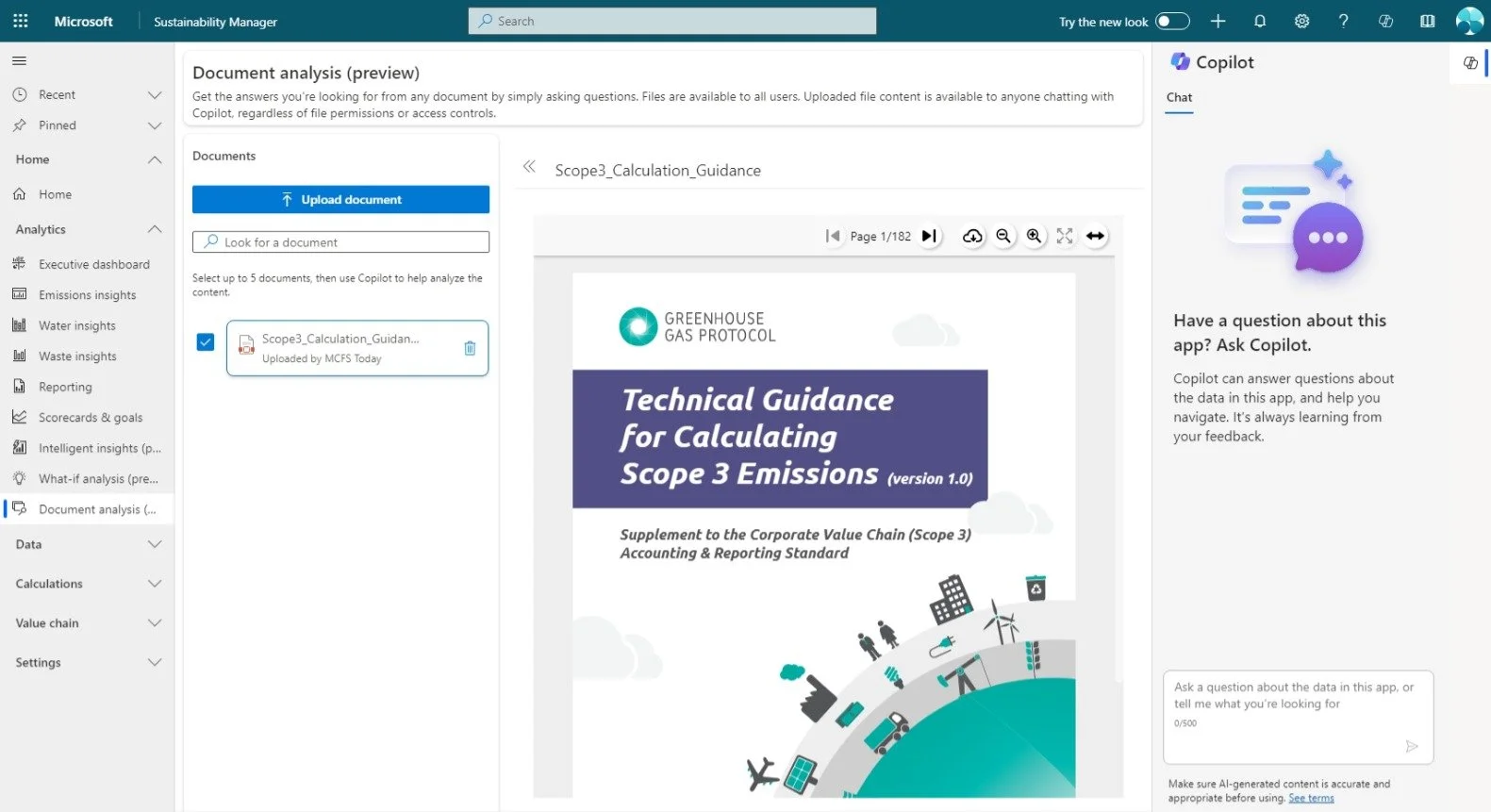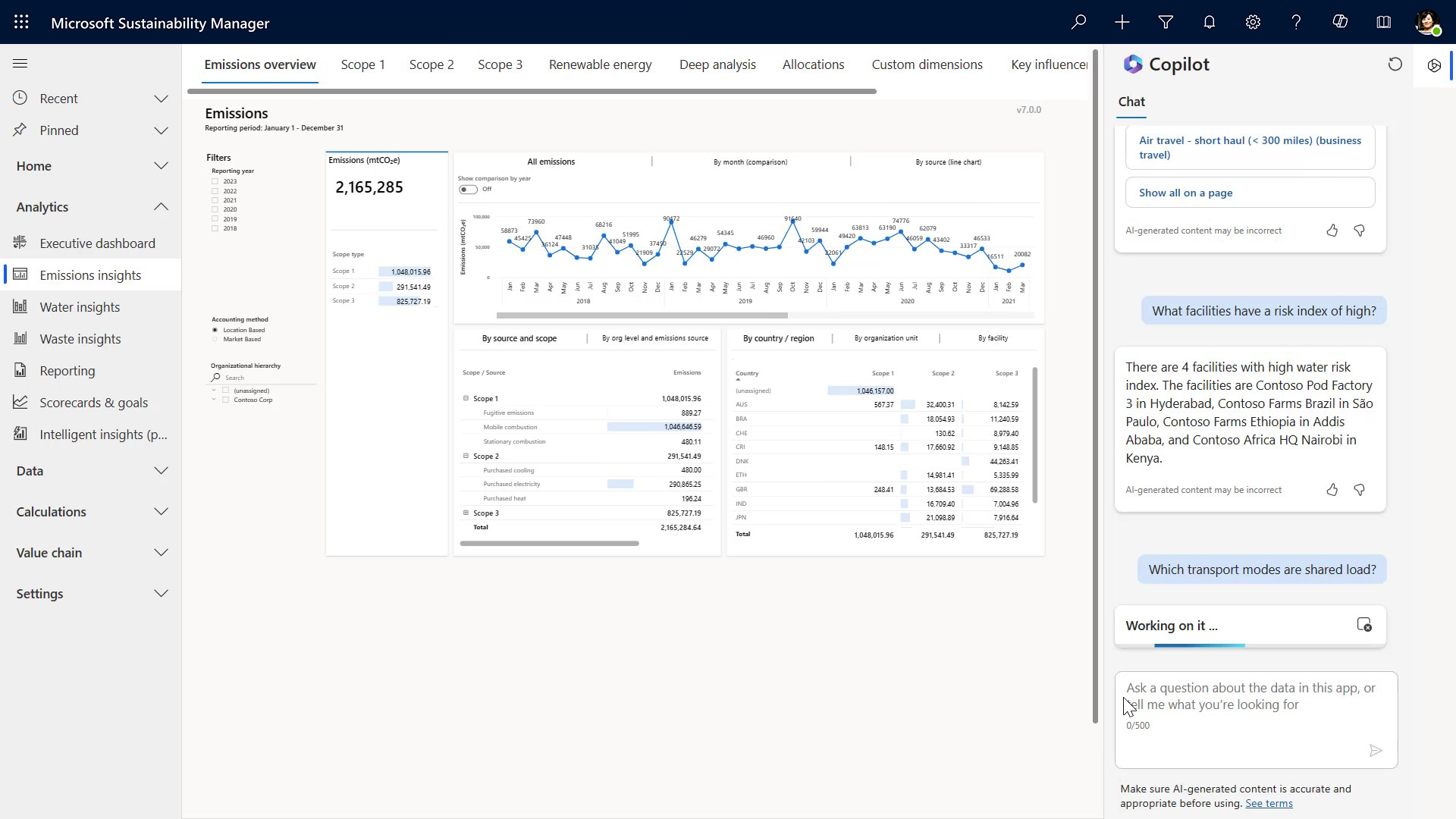How Artificial Intelligence (AI) Can Help Organizations in ESG Reporting
Introduction to AI in Sustainability
Artificial Intelligence (AI) is revolutionizing sustainability initiatives by processing vast amounts of data and delivering insights at unprecedented speeds. Copilot brings a growing set of skills that help you complete various tasks. In the quest for a sustainable future, AI has become indispensable.
Copilot in Microsoft Cloud for Sustainability: A Game-Changer
Microsoft's Cloud for Sustainability introduces a comprehensive suite of data and AI tools designed to enhance capabilities in managing environmental, social, and governance (ESG) aspects. Some of the latest features:
Analyze ESG documents with Copilot
Copilot allows users to upload ESG-related documents and ask questions about their contents. This feature uses advanced AI to analyze the documents, making it easier to extract and understand crucial information. By simply asking Copilot, users can quickly get answers to specific queries, such as compliance details, sustainability metrics, and performance indicators. This capability significantly streamlines the process of managing and reviewing extensive ESG documentation, improving efficiency and accuracy.
Analyze documents with Copilot in Microsoft Sustainability Manager
Create a report with Copilot using natural language
Creating detailed sustainability reports, such as emissions or Corporate Sustainability Reporting Directive (CSRD) reports, is now simpler with Copilot. Users can leverage natural language to instruct Copilot to generate these reports. This feature ensures that complex reporting requirements are met accurately and efficiently. By automating the creation of these reports, organizations can save valuable time and resources while ensuring compliance with regulatory standards.
Create reports with Copilot in Microsoft Sustainability Manager
Forecast emissions with what-if analysis
What-if analysis in Microsoft Cloud for Sustainability enables organizations to forecast the carbon emissions impact of changing business practice variables over time.
This intelligent model helps in evaluating different scenarios and their potential outcomes, allowing businesses to make informed decisions.
By understanding the implications of various practices on their carbon footprint, companies can strategize more effectively to reduce emissions and enhance their sustainability efforts.
Query data with Copilot
With Copilot, users can ask questions about their organization's data and quickly extract the needed information. Whether it's finding a specific assessment report value or retrieving an organizational unit's revenue, Copilot simplifies data querying.
This feature enhances data accessibility and usability, enabling stakeholders to make data-driven decisions promptly. By providing quick and accurate responses, Copilot supports better management of sustainability initiatives.
Query data with Copilot in Microsoft Sustainability Manager
Create calculation models with Copilot
Copilot's ability to create calculation models based on user descriptions is a powerful tool for sustainability management. Users can describe the calculation model they need, and Copilot will generate it. This functionality is particularly useful for developing complex models to calculate emissions, resource usage, and other sustainability metrics.
By automating model creation, organizations can ensure precision and consistency in their calculations, facilitating more effective sustainability planning and reporting.
AI in Action: Real-Life Sustainability Examples
Södra's Journey with AI and Microsoft Sustainability Manager
Södra, Sweden’s largest forest-owner association, with over 3.000 employees, 52.000 forest owners as members, and customers all around the world. They process the sustainable raw materials from the members responsibly managed forests.
How Did Södra Operate Before Copilot?
Before adopting Microsoft Sustainability Manager, Södra used Excel to collect annual data and calculate GHG emissions. Data for scope 1 and scope 2 were collected quarterly, partly by an automated process. This approach made it difficult to see the full picture of their emissions and make operational decisions on their climate impact. They faced increased demands for sustainability reporting, both internally and externally, requiring more detailed data.
Södra’s Sustainability Journey: Growing with Purpose
Collaborating with Microsoft, Södra initiated a proof of concept to evaluate the system. They started implementing scope 1 & 2 emissions with automated flows and later added scope 3.
Keys to success included knowing data sources, automating valuable data, and improving data quality with more granular collection. By using Microsoft Sustainability Manager, Södra reduced manual reporting and increased data update frequency to monthly.
With the new AI capabilities in Microsoft Sustainability Manager, we can be more productive, which was the initial goal. The Copilot feature is very user-friendly, and I am optimistic about how it will revolutionize our workflows and accelerate our sustainability initiatives.
Cristian Brolin, Chief Digital Officer at Södra
The Future of ESG Reporting: Multi-Agentic AI
As ESG reporting evolves, so does the role of AI. One of the most promising advancements is the use of Multi-Agentic AI, a collaborative network of specialized AI agents, each handling distinct tasks like data validation, regulation mapping, or stakeholder sentiment analysis.
In practice, this means AI can simulate a team of ESG analysts:
One agent gathers and cleans Scope 3 data
Another compares it against CSRD disclosure rules
A third draft report sections
And another flags risks based on recent ESG benchmarks or stakeholder feedback
By integrating Multi-Agentic AI capabilities, ESG reporting platforms can enhance automation, collaboration, and accuracy, enabling sustainability teams to transition from manual workflows to orchestrated intelligence throughout the ESG reporting process.
Certified Innovation: Terra Reporting's Recognition by Microsoft
We’re proud to share that Terra Reporting has been officially recognized by Microsoft as a Certified Software Partner for Sustainability AI Solutions. This designation underscores our technical expertise and deep understanding in developing AI-powered ESG solutions on the Microsoft Cloud for Sustainability.
At the heart of this recognition is our Double Materiality Assessment Copilot Extension, built using Copilot Studio and Microsoft Dataverse. It enables ESG professionals to interact with stakeholder assessments, IRO (Impact, Risk, Opportunity) data, and regulatory frameworks in real-time, all within a conversational AI experience tailored for the complexities of CSRD and sustainability reporting.
This certification brings peace of mind to our clients, reaffirming our commitment to responsible AI, data privacy, and compliance-ready technology, while also ensuring smooth integration with Microsoft 365, Dynamics, and Azure.
Accelerating Change Together & Take the Next Step!
By integrating AI, organizations can significantly enhance their decision-making processes, improve accuracy in reporting, and discover innovative growth strategies—all crucial for a transformative and sustainable future.
Encourage your organization to explore how AI can transform your sustainability efforts. Assess your current tools and identify areas where AI could make a significant impact. For more information on how Microsoft and Terra Reporting can assist you in adopting AI in your ESG reporting journey, consider booking a free demo or getting in touch.
Frequently Asked Questions (FAQ)
AI helps organizations handle complex ESG data, improve accuracy in reporting, and model different scenarios to understand environmental impacts. It enables faster insights, better decision-making, and more efficient sustainability strategies.
AI tools like Copilot let users upload ESG documents and quickly extract or summarize key info (metrics, compliance, performance).
It’s a feature so you can model different scenarios (e.g. changes in operations) and see how they affect emissions or other ESG metrics.
It’s using multiple AI agents each focused on specific tasks (e.g. data validation, regulatory mapping, stakeholder analysis) to improve precision, speed, and collaboration.




